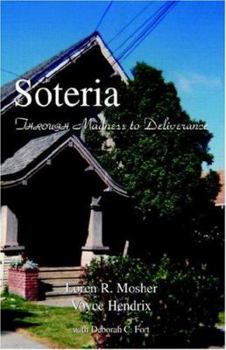Soteria
Select Format
Select Condition 
Book Overview
This is the story of a special time, space, and place where young people diagnosed as "schizophrenic" found a social environment where they were related to, listened to, and understood during their... This description may be from another edition of this product.
Format:Paperback
Language:English
ISBN:1413465234
ISBN13:9781413465235
Release Date:December 2004
Publisher:Xlibris
Length:360 Pages
Weight:1.08 lbs.
Dimensions:0.8" x 5.5" x 8.5"
Customer Reviews
5 ratings
I wish Soteria was still alive!
Published by Thriftbooks.com User , 14 years ago
A very useful book for those who have been victims of the mental health system in the USA. It gives you hope and insight into alternative treatments without medication. I wish the place was still open....I hope someone would take this vision and build upon it!!
Excellent, excellent book
Published by Thriftbooks.com User , 15 years ago
Gives the reader a thorough look at what truly productive mental health care looks like. It also becomes obvious to the reader that this method is not used today because it is not supporting the drug and psychiatric industry. If anyone wants true healthy recovery and their life to be productive this project reveals the way it was supposed to be.
Damage Vs. Understanding
Published by Thriftbooks.com User , 17 years ago
Why read the book? 1..Buying it supports vital work. 2..Less than 1% of the book can appear here. 3..Change, action and recovery can replace hand-wringing. 4.."Understanders" are therapeutic for the seriously disturbed. Soteria (Greek for deliverance) was a community-based, experimental, residential treatment facility in San Jose CA during 1971-1983, offering refuge mostly to young "schizophrenics." Would Soteria be as effective...as a nearby psychiatric ward where antipsychotic drugs were highly valued? Focus: Given...that people labeled as "schizophrenic" often cannot develop or maintain close interpersonal relationships and supportive (non-family) network systems, Soteria believed these should comprise its focus. The Moos Social Scales, which were heeded by Soteria, tallied staff's judgments about treatment areas, as they measured involvement, support, spontaneity, autonomy, practical orientation, personal problem orientation, tolerance of anger and aggression, order and organization, program clarity, and staff control. Causation of Psychosis: More than half of adult admissions...to psychiatric hospital wards have histories of sexual and/or physical abuse. Also there may be parents' inability to focus and be clear, and parents' hostility toward their children... When someone goes "crazy," it's often in response to numerous problems, usually triggered by a particularly distressing event like a romantic rejection, the death of a parent, or excessive involvement with recreational drugs - - or inability to form social networks apart from families of origin. Violence was much less than in hospital settings, but residents sometimes struck out at staff members who reminded them of their parents; and they also sometimes hit, kicked or bit or verbally abused others, because they felt defrauded, cheated, robbed, neglected, or otherwise treated unfairly. Realizations and Incentives: 1..Elaborate institutions can impinge negatively on psychotically disorganized people. They often must be inflexible, must rely on authority, must institutionalize roles, and must rest decision-making power and responsibility in a hierarchy outside the client's control - staff and patients often feel powerless, irresponsible and dependent. 2..Jerome Frank's massive review of studies of therapy found, ...that therapist experience, duration of treatment, type of problem, patient characteristics, theory of intervention, etc., generally had no relation to patient outcome. 3..The World Health Org. has found that "schizophrenia" outcomes in poor countries like India, Nigeria and Columbia, where only a small percentage of patients are maintained on antipsychotic medications, are much, much better than in rich countries like the United States. 4..A massive 1979 World Health Org. study of "schizophrenic" outcomes correlated recovery with low reliance on neuroleptic medication... 5..The first case reports of tardive dyskinesia appeared in 1956. ...1:4 patients started on neuro
An important work
Published by Thriftbooks.com User , 19 years ago
Soteria is the exposition of a grand experiment in the holistic treatment of schizophrenia and is recommended reading for anyone who has an interest in mental illness. When one applies outcomes criteria to the Soteria program, it holds up as equally effective to any of today's drug therapies. I applaud the authors for their very accessible and important work.
Soteria's Message for today
Published by Thriftbooks.com User , 19 years ago
In "Soteria: Through Madness to Deliverance," Loren Mosher and Voyce Hendrix, with Deborah Fort, paint a vivid picture of the day to day life at Soteria-House, the Northern California alternative to psychiatric hospitalization that proved it is possible to help people through madness with kindness, empathy and validating people's experiences, and most importantly, by "being with" people, rather than "doing to" them. Due to his prolific writings, Dr. Mosher has presented many scientific papers on Soteria, but in this book, the program comes to life. The failures as well as the successes are described. Only with this book has it been possible to get a sense of what it was like to be at Soteria. Through the truly dedicated and caring staff, such as the incredible Voyce Hendrix (and even the residents), people were allowed their madness and, through being allowed their madness, able to get through it and on with their lives. This book is a must read for anyone interested in alternatives to the prevailing pessimistic paradigm of psychiatric treatment. It is truly a story of hope. A story of a better path -- a path not currently taken. Dr. Mosher, loved "being with" people who were psychotic. He called them "my most interesting customers." Dr. Mosher, passed away in July of 2004, at the age of 70, five months before the book was published. He must have written this book knowing that his personal efforts on behalf of providing a humane form of care was going to cease. Thus, "Soteria: Through Madness to Deliverance" must be seen as his final act of love to people experiencing disturbing psychosis by leaving a trail to follow for those who have the vision to see it.





